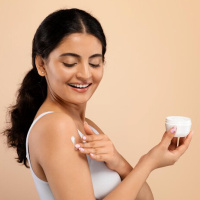Cosmetic Manufacturer for Skincare, Haircare & Makeup Brands

Cosmetic Manufacturer
In todays booming beauty industry, becoming a cosmetic manufacturer is a promising business opportunity. From skincare to makeup and hair care, cosmetic products are in high demand. But what does it really take to be a Whether you’re a beauty entrepreneur, a startup founder, or someone passionate about cosmetics, this guide covers everything you need to know from how to become one, how to find one, and how to grow in this competitive market.

What is a cosmetic manufacturer Factory?
A cosmetic is a company or individual responsible for producing beauty and personal care products. These can include items such as lotions, lipsticks, foundations, shampoos, cleansers, and much more. The manufacturing process involves formulation, testing, packaging, and regulatory compliance.
Whether you're launching a private label brand or creating custom formulations, working with the right is crucial for success. Some manufacturers also offer R&D services, packaging solutions, and even white-label products for quick market entry.

Why the Role of a Cosmetic Production Company is So Crucial
In the beauty industry, quality is everything. A reliable ensures that your products are safe, effective, and appealing. Here’s why choosing or becoming a competent matters:
-
Product Quality Safety: High-quality ingredients and proper formulations are essential for safe, skin-friendly products.
-
Compliance Certification: An experienced understands FDA regulations, GMP practices, and labeling standards.
-
Innovation: Manufacturers often lead innovation by developing new textures, ingredients, and packaging trends.
-
Scalability: Whether you need 1,000 units or 100,000, a good helps scale operations efficiently.
How to Become a Cosmetics Factory cosmetic manufacturer
Many people ask While it's an exciting path, it involves planning, investment, and compliance. Here’s a step-by-step breakdown:
1. Understand the Industry
Research the types of products you want to manufacture skincare, makeup, hair care, etc. Learn about market trends, consumer preferences, and industry challenges.
2. Develop Your Formulas
If you’re creating your own brand, you need product formulas. Hire a cosmetic chemist or R&D lab to help develop unique, effective, and safe formulations. Cosmetic Manufacturer
You can also partner with a that offers formulation services.
3. Set Up a Certified Manufacturing Facility
You can build your own lab or outsource to a contract . If setting up in-house, ensure the facility meets GMP (Good Manufacturing Practices) standards and is licensed according to your country’s regulations.
4. Get Legal Approvals
Comply with local and international regulations. In the U.S., for example, you’ll need to follow FDA guidelines. Get certifications like cruelty-free, organic, or vegan if needed.
5. Start Manufacturing
Once everything is in place formulations, approvals, packaging begin your first production run. Focus on quality control, consistency, and documentation at every stage.
How to Find a Skincare Manufacturer
Whether you're a startup or an established brand looking to scale, you might wonder how to find a that aligns with your values and goals. Here's how:
1. Define Your Needs
Do you need private label products or custom formulations? Do you want small MOQ (minimum order quantity) or large-scale production? Define what kind of you’re looking for.
2. Search Online Directories
Platforms like Alibaba, ThomasNet, and CosmeticIndex.com list verified manufacturers. Use the keyword along with your location or product type.
3. Attend Trade Shows
Events like Cosmoprof and In-Cosmetics Global bring together leading s. Networking at these events can lead to valuable partnerships.
4. Request Samples and Audits
Before finalizing any manufacturer, request product samples and, if possible, visit their facility. A trustworthy will always be transparent.
Read Also:
Skin Care Products Manufacturers
TYMK Health & Wellness
Benefits of Working With a Contract
If you’re not ready to build your own lab, a contract can handle production while you focus on branding and marketing. cosmetic manufacturer
Here’s why many startups prefer this model:
-
Cost-effective: No need to invest in equipment or staff.
-
Expertise: Established s have experienced chemists and QA professionals.
-
Speed to market: You can launch products faster using white-label or existing formulations.
-
Regulatory assurance: Most contract manufacturers already follow legal compliance.
Choosing the Right : Key Factors
Not all s are created equal. Here are key factors to consider:
-
Experience in your product category
-
Minimum order quantities
-
Certifications (GMP, ISO, FDA, etc.)
-
Quality control processes
-
Custom formulation options
-
Packaging services
-
Client references or testimonials
Trends in the Cosmetic Manufacturing Industry
The beauty industry evolves rapidly, and the best s stay ahead of the curve. Some of the latest trends include:
-
Clean Beauty: Natural and chemical-free products are in demand.
-
Sustainable Manufacturing: Eco-friendly packaging and low-waste processes.
-
Inclusive Products: Formulations that cater to diverse skin tones and types.
-
Technology Integration: Use of AI, 3D printing, and smart packaging in product development.
FAQs- cosmetic manufacturer
1. How can I learn about the cosmetics manufacturing process?
Take online courses or read industry resources on formulation and production.
2. How does cosmetic manufacturing work?
It involves formulating, testing, producing, and packaging cosmetic products.
3. How can I find cosmetic manufacture?
Use B2B platforms like IndiaMART or attend industry trade shows.
4. What are the best cosmetic manufacture in India?
Top options include Bo International, HCP Wellness, TYMK, and Vasa Cosmetics.
5. I want a list of cosmetic manufacturering in Gujarat, India.
Search on IndiaMART or Justdial for manufacturers in Ahmedabad, Vadodara, and Rajkot.






















